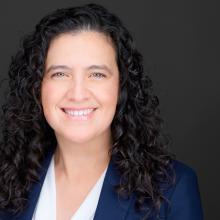How did you choose developmental science as a career?
My interest in studying bilingual language development stems from my experience as a kindergarten teacher in the same Latino neighborhood where I grew up. I taught in a Transitional Bilingual Education (TBE) program. In these programs, instruction is initially provided mostly in the native language, with the ultimate goal of transitioning to English-only instruction. The (English monolingual) administrators at my school often touted their belief that children would be “confused” if we did not keep the two languages separate in the classroom. However, each school day, I witnessed my students using two languages in a seemingly effortless way. As a Latina, and having grown up bilingual myself, I rejected the notion that learning and using two languages simultaneously was detrimental to learning. So, I applied to graduate school to be able study how language exposure and use influences bilingual language development. I was accepted to the Ph.D. program in Developmental Psychology at the University of Chicago, where I learned about language development from experts in the field of child language. My advisors, Dr. Janellen Huttenlocher and Dr. Susan Levine, whose primary research interests were not in the area of bilingualism, nevertheless supported me in asking research questions related to bilingual language development, which I continue to investigate today.
Is there a mentor or mentors who have been instrumental to your career path so far, and, if so, who and how?
I have participated in excellent mentoring programs and was fortunate to be paired with generous mentors. For example, Dr. Jenny Wiley (University of Illinois at Chicago) was my mentor for the Summer Research Opportunities Program (SROP), a university program designed to provide historically under-represented undergraduate students with research training. I vividly remember when Jenny high fived me after running analyses on our data. I remember thinking: “Research is so much fun!” As director of my Bilingual Language Development Lab at LUC, I try to be just as inspiring to my own students! Jenny not only mentored me through my first independent research project, but also generously guided me through the graduate school application and interview process, which set me on my path as a language researcher.
I also participated in the William T. Grant Foundation’s mentoring program for junior scholars of color. My mentor was my postdoctoral advisor, Dr. Nonie K. Lesaux (Harvard Graduate School of Education), who was instrumental in helping me learn how to navigate an interdisciplinary research program, combining the fields of psychology and education.
As the first in my family to graduate from college, attend graduate school, and earn tenure at an institution of higher learning, I have also relied heavily on informal mentors to help me navigate the world of academia. I would be remiss to not mention the people who may not even have known that they were mentoring me, but nevertheless supported me at critical junctures of my school and career trajectory. For example, Dr. David Francis advised me on my post-doctoral plans, Dr. Catherine Snow advised me on conducting my first longitudinal study on bilingual language development, and my high school teacher, Ms. Peg Frigo, encouraged my plans to apply to college.
What advice would you give to a prospective graduate student thinking about beginning their Ph.D. studies in the developmental science field?
Academia can be isolating, especially if there are few (or no) scholars in your program doing research that is similar to yours. Take advantage of programs like the SRCD Latinx Caucus and Towards 2044 Horowitz Mentoring program to get connected with like-minded scholars and forge new research collaborations.
What is your best SRCD memory?
Having been the only graduate student in my Ph.D. program doing research on bilingualism in Latino children, I often felt isolated, especially when attending conferences. When I attended my first SRCD Latinx Caucus social event at the 2009 Biennial Meeting in Denver, Colorado, I remember feeling like I had finally found my academic community. In fact, the highlight of each Biennial meeting is connecting with fellow SRCD Latinx Caucus members, who are not only my colleagues, but also friends.
Why did you join the Latinx Caucus and how does it facilitate connection among members all year long?
As noted above, I joined the Caucus because it was a welcoming space during the Biennial. One primary way to connect with other Latinx Caucus scholars outside of the Biennial is to serve on one of the various subcommittees. As a case in point, in my current roles as Secretary and Chair for the Publications and Communications subcommittee, I’ve been able to forge new personal and professional relationships with members of the subcommittee as well as the scholars who are featured in our monthly spotlights.
